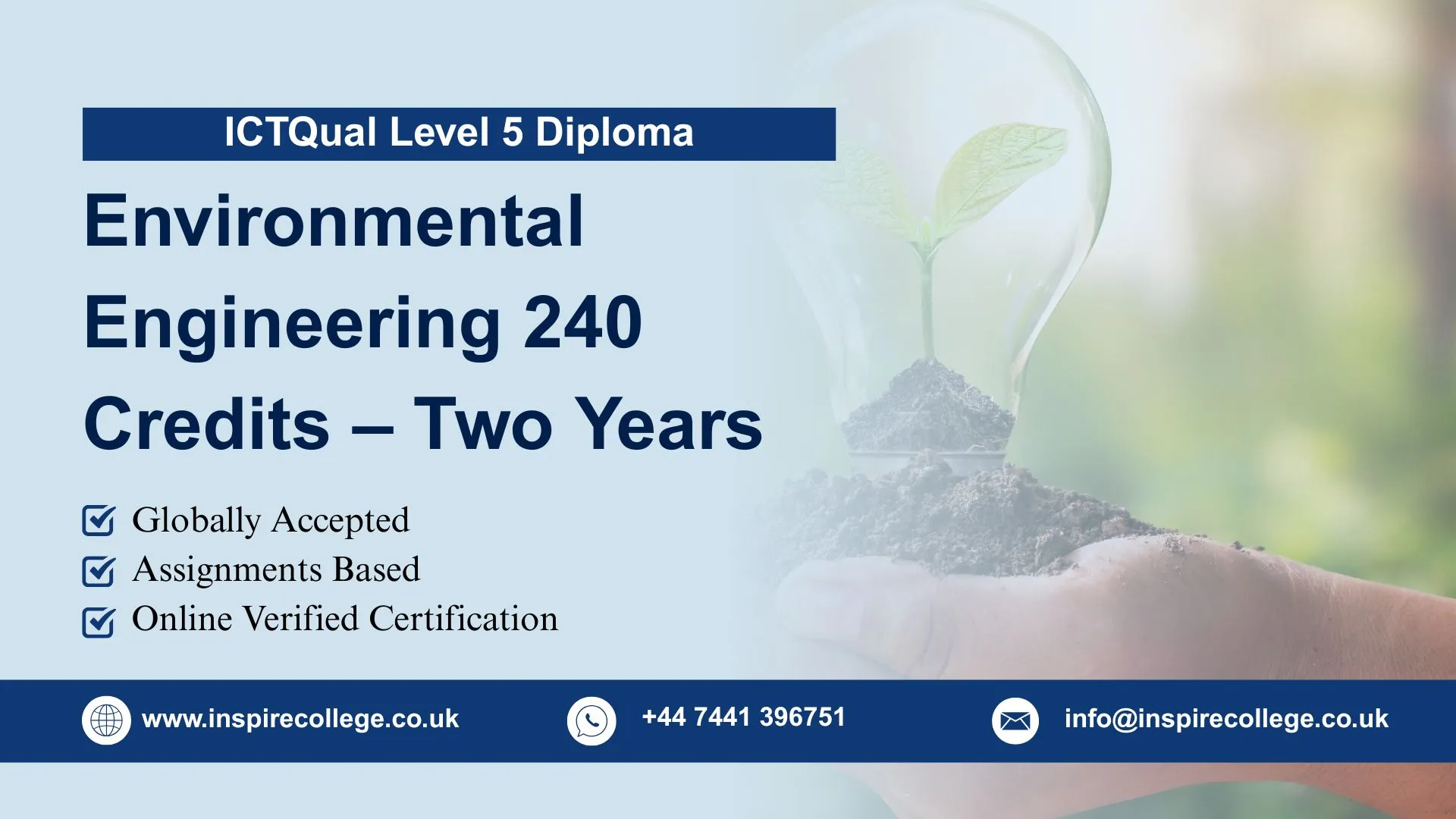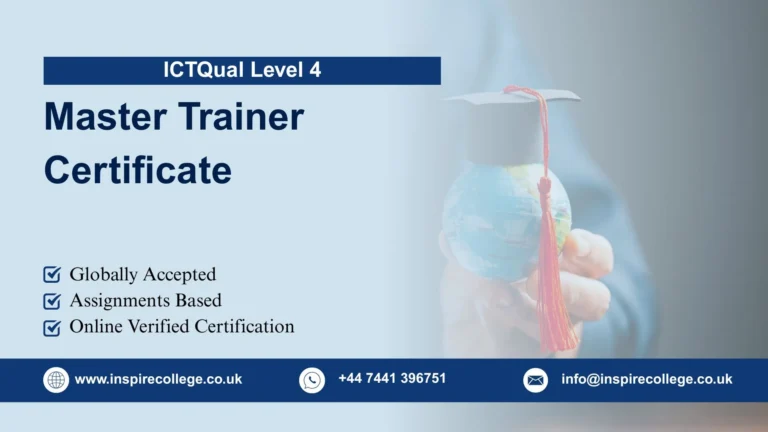
ICTQual Level 5 Diploma in Environmental Engineering 240 Credits – Two Years
A Level 5 Diploma in Environmental Engineering offers a comprehensive pathway for individuals looking to build a solid foundation in the field of environmental engineering. This two-year program is designed to equip students with the knowledge and skills required to address environmental challenges, focusing on the scientific and technical aspects of the discipline. The course emphasizes practical solutions to environmental issues, combining theoretical understanding with hands-on experience.
Throughout the duration of the program, students will delve into topics such as sustainable energy systems, waste management, water resources management, and environmental legislation. The curriculum is designed to ensure students are well-versed in the principles of environmental protection and sustainable development. With a mix of classroom learning and practical projects, the Level 5 Diploma aims to provide students with the tools they need to contribute effectively to the protection of the environment.
A key component of the course is its focus on developing problem-solving and analytical skills. Students will be trained to assess environmental risks, design and implement sustainable engineering solutions, and evaluate the effectiveness of these solutions. The program also offers insight into emerging technologies and innovative approaches to environmental management, preparing graduates to meet the evolving demands of the industry.
Upon completion of the two-year course, students will be ready to take on roles in various sectors, including government agencies, consulting firms, and large corporations. The skills acquired will be applicable in a range of areas, from pollution control to renewable energy solutions. Graduates will also be well-prepared to continue their studies in environmental engineering at a higher level, with the Level 5 Diploma serving as a stepping stone for further academic and professional growth.
For individuals seeking a rewarding career in environmental engineering, the Level 5 Diploma offers a structured and rigorous educational path. This qualification not only opens doors to a wide range of career opportunities but also plays a critical role in promoting environmental sustainability and addressing the global challenges of climate change, resource depletion, and pollution.
While not mandatory, prior exposure to environmental science, sustainability, or related fields can be helpful in understanding course concepts and building practical knowledge.
Mandatory Units
The ICTQual Level 5 Diploma in Environmental Engineering 240 Credits – Two Years, achieve the qualification candidates must achieve all of the mandatory units:
Mandatory Units
Year 1:
- Introduction to Environmental Engineering
- Environmental Legislation and Policy
- Principles of Sustainable Development
- Waste Management Systems
- Water Resources and Management
- Environmental Impact Assessment
- Environmental Chemistry
- Renewable Energy Technologies
- Air Quality Management
- Soil and Groundwater Protection
- Environmental Data Analysis and Interpretation
- Introduction to Environmental Health
Year 2:
- Advanced Environmental Engineering Principles
- Environmental Risk Assessment
- Sustainable Infrastructure and Construction
- Pollution Control and Remediation
- Climate Change and Environmental Adaptation
- Environmental Monitoring and Measurement Techniques
- Green Technology and Innovations
- Energy Efficiency in Environmental Engineering
- Environmental Ethics and Corporate Social Responsibility
- Environmental Economics and Policy Development
- Project Management in Environmental Engineering
- Research Methods in Environmental Engineering
Year 1: Learning Outcomes
- Introduction to Environmental Science
- Understand basic environmental science concepts, ecosystems, and biodiversity.
- Recognize human impacts on the environment and the importance of sustainability.
- Fundamentals of Environmental Engineering
- Demonstrate knowledge of core environmental engineering principles and practices.
- Apply engineering solutions to address environmental challenges.
- Sustainable Development Practices
- Develop an understanding of sustainable development theories and practices.
- Analyze strategies for balancing environmental, economic, and social factors.
- Climate Change and its Impacts
- Understand the causes and effects of climate change on ecosystems and human societies.
- Evaluate mitigation and adaptation strategies to combat climate change.
- Pollution Control Technologies
- Identify various pollution control technologies for air, water, and soil.
- Assess the effectiveness of pollution control methods in different contexts.
- Energy Systems and Environmental Impact
- Understand the environmental impact of traditional and alternative energy systems.
- Explore methods to reduce the environmental footprint of energy production.
- Environmental Legislation and Policy
- Identify key environmental laws and policies at national and international levels.
- Understand the role of government regulations in environmental protection.
- Water Quality Management
- Learn techniques for assessing and improving water quality.
- Apply water management practices to prevent pollution and ensure sustainability.
- Waste Management and Resource Recovery
- Examine waste management strategies and technologies.
- Promote resource recovery and recycling to reduce landfill dependency.
- Environmental Risk Assessment
- Understand environmental risk assessment methodologies.
- Analyze and manage potential environmental risks from industrial or natural sources.
- Environmental Health and Safety
- Identify health and safety risks in environmental engineering practices.
- Implement measures to protect public health and safety in environmental projects.
- Introduction to Renewable Energy
- Learn about various renewable energy sources and their applications.
- Assess the environmental benefits and challenges of renewable energy systems.
Year 2: Learning Outcomes
- Ecosystem and Biodiversity Management
- Understand ecosystem dynamics and biodiversity conservation strategies.
- Develop management practices to protect and restore ecosystems.
- Environmental Data Collection and Analysis
- Gain skills in collecting and analyzing environmental data.
- Use data to inform decision-making in environmental engineering projects.
- Environmental Monitoring and Reporting
- Learn methods for monitoring environmental quality and sustainability.
- Develop clear, comprehensive environmental reports for stakeholders.
- Advanced Environmental Engineering
- Apply advanced environmental engineering concepts to solve complex environmental issues.
- Evaluate engineering solutions for sustainability and long-term effectiveness.
- Renewable Energy Technologies
- Explore advanced renewable energy technologies, including solar, wind, and bioenergy.
- Assess the feasibility and impact of integrating renewable energy into existing systems.
- Environmental Economics and Sustainability
- Understand the economic principles of sustainability.
- Evaluate the cost-benefit of environmental projects and their long-term economic viability.
- Land Rehabilitation and Restoration
- Learn techniques for land restoration and rehabilitation after environmental damage.
- Design and implement land restoration projects to improve ecosystem services.
- Environmental Impact Assessment (EIA)
- Gain expertise in conducting Environmental Impact Assessments for projects.
- Analyze the potential environmental effects of development and suggest mitigation strategies.
- Green Building and Sustainable Infrastructure
- Understand sustainable building practices and green construction techniques.
- Integrate environmental considerations into infrastructure design and construction.
- Pollution Prevention and Waste Minimization
- Develop strategies to prevent pollution at the source.
- Apply waste minimization techniques to reduce environmental impacts.
- Environmental Management Systems (EMS)
- Learn to design and implement Environmental Management Systems (EMS) in organizations.
- Promote environmental compliance and continuous improvement in sustainability practices.
- Sustainable Transport and Mobility
- Understand sustainable transportation systems and their impact on urban planning.
- Evaluate policies and technologies to reduce transportation-related environmental damage.
The ICTQual Level 5 Diploma in Environmental Engineering is ideal for individuals who are passionate about environmental protection and sustainability. It is designed for those seeking to build a career in environmental engineering, particularly in roles that require knowledge of both the technical and regulatory aspects of environmental management.
This course is well-suited for:
- Aspiring Environmental Engineers – Individuals looking to develop the technical skills required to design and implement sustainable engineering solutions.
- Environmental Science Graduates – Those with a background in environmental sciences who wish to specialize in the engineering aspects of environmental protection.
- Technicians and Engineers – Professionals in related fields who want to enhance their knowledge and qualifications in environmental engineering.
- Graduates Seeking Career Advancement – Individuals who wish to transition into the environmental engineering sector from other engineering disciplines.
- Sustainability Enthusiasts – People committed to creating a positive environmental impact and advancing sustainable practices in various industries.
Overall, the course is for individuals who aim to contribute to addressing global environmental challenges, from pollution control to resource management, and want to pursue a rewarding career in the field of environmental engineering.
Register Now
FAQs for ICTQual Level 5 Diploma in Environmental Engineering 240 Credits – Two Years






